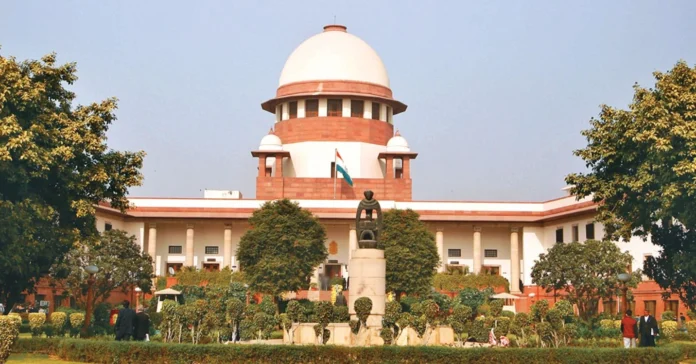The Supreme Court on Monday refused to interfere with the Madras High Court ruling that restrained Dravida Munnetra Kazhagam from sending OTP verification messages to the mobile numbers of persons under its ‘Oraniyil Tamil Nadu’ scheme running across Tamil Nadu.
The Bench of Justice PS Narasimha and Justice AS Chandurkar appreciated the High Court for handling the issue related to personal information with sensitivity.
Appearing for the DMK, Senior Advocate P Wilson submitted that the scheme was a mass membership door-to-door drive organised across Tamil Nadu by the DMK, which parties like Bharatiya Janta Party and Aam Aadmi Party also carry out.
The Counsel objected to the interim injunction, stating that there was no prayer before the High Court seeking interim relief. He further said that the High Court proceeded on the assumption that DMK was asking for Aadhaar details.
The party, however, was only verifying the OTP. DMK’s concern was whether a family was availing any Government scheme. It wad asking people whether they supported the party’s cause, noted Wilson, adding that the 45-day programme has come to a standstill.
He said 1.7 crorepati members have come and offered themselves. There was not even a single complaint in any police station saying that that DMK was torturing them.
The Apex Court observed that citizens had a right to be flexible in their choices of the party. If DMK was asking them to commit for something like this, the party might [impinge] on their freedom. They might join a party or leave it or keep it open-ended. DMK must have a record of their predilections. The High Court did the right thing.
When the Counsel submitted that other parties following a similar scheme were equally bad and that there was no justification just because their schemes have not been challenged, the Apex Court told him to act more like a lawyer and less as a spokesperson of DMK. Don’t get involved in it, the Court advised him.
Wilson pointed out that the High Court referred to the Draft Data Protection Bill, which was not even in place. The High Court itself was not clear while granting the injunction, he added.
The Bench responded by saying that the Court had to protect the citizens.
One Rajkumar (Respondent before the Supreme Court) had filed a writ petition in the Madras High Court seeking to declare the collection and use of Aadhaar card details by the DMK and its functionaries for political propaganda under its Oraniyil Tamil Nadu scheme as unconstitutional.
Oraniyil scheme is a mass membership door-to-door drive organised across Tamil Nadu by the DMK party, in which personal information, including phone numbers, is allegedly obtained and OTP verification messages are sent on the numbers. The petitioner argued that it concerned the data protection of the individuals, which formed an essential part of Article 21.
The petitioner further sought an investigation by the UIDAI and the Central government into the alleged unauthorised collection of Aadhaar data by the DMK.
Expressing serious concern over the storage and processing of the data, the High Court observed that the implications of the scheme for the right to privacy of the voters, including the right to privacy of their political affiliation, also ought to be examined. It passed an interim injuction, restraining DMK from sending OTP verification messages until the issues of right to privacy and data protection is examined in details.


